Georgia offers residents and businesses clean energy incentives to install solar panels and invest in clean energy vehicles.
In combination with federal tax credits for green energy, the cost of any new equipment installed can qualify.**
TAX INCENTIVE NOTICE*
**Fraud Alert**
US Green Energy
Click Here to Sign Up for Free Solar Panel Installation
| Schedule | Acceptance Date | Last Day To Register |
|---|---|---|
| Q1 | Monday January 1, 2024 | March 30, 2024 |
| Q2 | Monday April 1, 2024 | June 30, 2024 |
| Q3 | Monday July 1, 2024 | September 30, 2024 |
| Q4 | Tuesday October 1, 2024 | December 30, 2024 |
| Q1 (2025) | Wednesday January 1, 2025 | March 30, 2025 |
Home Energy Rebate Programs
State Energy Program
PLEASE NOTE: Beginning in 2025, the federal tax incentives for solar residential installation will be impacted. See the table below for the dates and amounts currently legislated.
**The Federal tax credit is available every year that new equipment is installed.
Georgia Government
The Office of the Governor
206 Washington Street
111 State Capitol
Atlanta, GA 30334
(404) 656-1776
Hours: M-F 8:00am – 5:00pm
Georgia Power
96 Annex
Atlanta, Georgia 30396
Residential Customer Service
(888) 660-5890
Business Customer Service
(888) 655-5888
Hours: M-F 8:00am – 5:00pm
Energy Division
Georgia Environmental Finance Authority – Energy Resources Division
47 Trinity Ave SW, Fifth Floor
Atlanta, GA 30334 US
Phone: (404) 584-1000
Fax: (404) 584-1069
[email protected]
Hours: M-F 8:00am – 5:00pm
Peachtree City Weather Bureau
4 Falcon Drive
Peachtree City, GA 30269
(770) 486-1133
[email protected]
Hours: Open Daily, 24 hours
Clean Energy and Vehicle Federal Tax Credits
Business Federal Tax Credits
State Tax Credit and Rebate Schedule
| Year | Credit Percentage | Availability |
|---|---|---|
| 2024-2032 | 30% | Individuals who install equipment during the tax year |
| 2033 | 26% | Individuals who install equipment during the tax year |
| 2034 | 22% | Individuals who install equipment during the tax year |
If you have determined that you are eligible for the green energy credit, complete Form 5695 and attach to your federal tax return (Form 1040 or Form 1040NR).
IRS Form 5695
Instructions
Future Due Dates and Basics
Office of Energy Efficiency & Renewable Energy
Forrestal Building
1000 Independence Avenue, SW
Washington, DC 20585
RESIDENTIAL CLEAN ENERGY TAX CREDIT
Georgia Clean Energy
Solar Resiliency Technical Assistance Program
Solar for All
Clean Vehicle Related Tax Credits
Power Outage Maps
Grid Resilience Grant Program
Energy Efficiency and Conservation Block Grant
Energy Performance Contracting
Contact
Environmental Protection Division
2 Martin Luther King Jr. Drive SE
Suite 1456, East Tower
Atlanta, GA 30334 US
Air Branch: (404) 363-7000
Land Branch: (404) 362-2537
Watershed Branch: (404) 463-1511
Monday – Friday: 08:00 a.m. – 04:30 p.m.
Georgia Solar Incentives Designed To Increase Home Solar Installations
In the very near future, the state government of Georgia will start heavily investing in an ongoing renewable energy initiative with a heavy emphasis on expanding and normalizing residential solar energy generation.
Federal-level solar tax credits can potentially help you recoup up to 30% of your solar module installation costs. There are also a few other solar tax incentives that can be added to the federal-level solar tax credit
This comprehensive guide provides all the information about Georgia solar incentives that can help homeowners disconnect from he state grid and generate their own power with a solar energy system at home.
Currently, Georgia ranks number 7 among the 50 states for solar adoption. Those numbers, however, primarily belong to solar farm and solar panel grid installations.
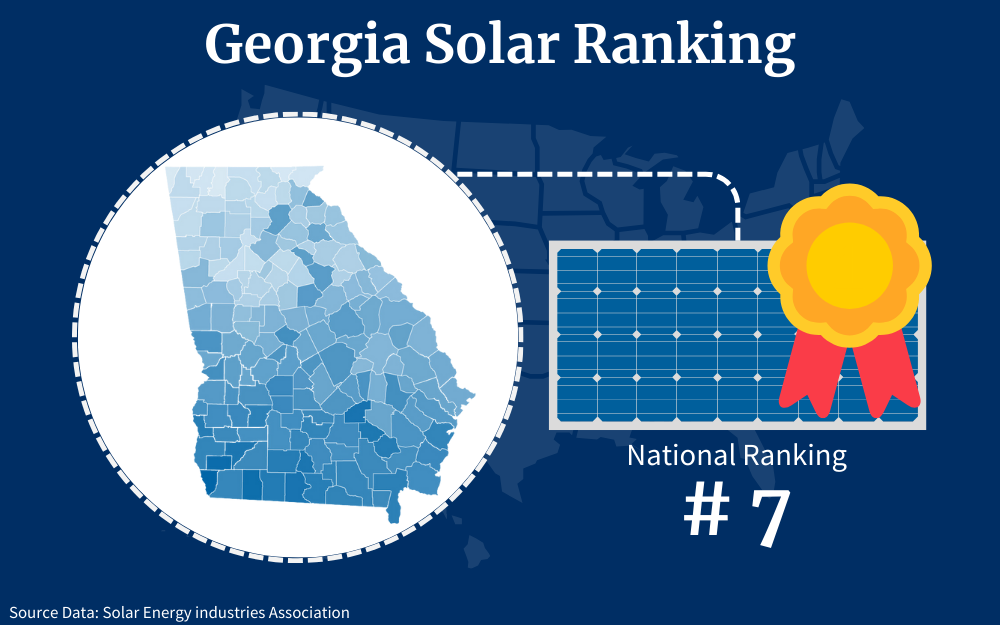
In January 2023, the state government authorities of Georgia commissioned a private solar energy manufacturing company called Qcells to build a $2.3 billion solar manufacturing plant within the state.1 The forthcoming Qcells solar power panels manufacturing plant will be built in an area called Cartersville which is located north of Atlanta.
The Qcells solar manufacturing hub will create a new state-wide solar energy economic infrastructure that will create thousands of new jobs and make solar panel technology more accessible and affordable to everyday Georgian households. The success of the Qcells solar energy manufacturing plant will also attract more outside investments for the benefit of the state.
The forthcoming Qcells solar manufacturing facility that will build renewable energy solar panels and affiliated equipment will come online sometime in 2024.
When it comes to the best states to invest in solar for homeowners, Georgia ranks seventh.2 Some estimates project that over 525,000 homes in Georgia may be powered by solar energy.
But that may be a misinterpretation of the facts since that 525,000 estimate may not completely represent actual homes with private solar power installations.
Residential Solar Power in Georgia
There are far more conservative residential solar energy system estimates that calculate less than 10,000 actual Georgia homes have solar panel systems on the rooftop or on the property.3 The majority of those half-million Georgia homes are getting solar-derived energy from state utility companies with massive solar panel farm facilities.
Some Georgia-based energy companies may be making hundreds of millions if not billions of dollars based on their own solar farm profit calculator metrics.
Less than 5% of the power generated within the state is derived from solar energy.3
For additional context, consider that the population of Georgia is just under 10.9 million people.4 In a state with almost 11 million inhabitants, perhaps half a million residents gain their electricity from solar power while less than 10,000 homeowners have actual solar panel installations on their property.
Solar Panel Tax Credits in Georgia
The state of Georgia is investing over $2.3 billion into a solar energy infrastructure future. The cost of your solar panel system could pay for itself within 20 years, which is when the rest of the population will begin playing catch-up with the energy infrastructure conversion to solar.
The average electric bill burden for an American household is $140 – meanwhile, the utility cost of electricity increased over 5% in 2022.5 With inflation as an incremental constant in life, you could pay off your solar panel system within 20 years and generate energy on your terms.
No matter the current state of solar energy in Georgia, you can’t afford to not invest in solar energy now if you are a homeowner. Here is what you need to know.
Federal Investment Tax Credit (ITC)
As a Georgia resident, this is the main solar tax credit incentive you need to invest in residential solar energy.
The ITC will cover 30% of the investment expenses you initially incur for solar panel equipment, parts, labor, and installation costs for a residential solar panel installation system.
The solar tax credit will cover 30% of the purchase cost of things like contractor labor, photovoltaic solar cell panels, rack and mounting equipment, wiring, inverters, solar heat pumps, wind turbines, solar water heaters, and solar batteries.
To qualify, you must own the home or property the solar panels will be installed on, reside there most of the time, and the equipment must be currently active.
The ITC is a one-time tax credit – however, you can apply again if you move to a new residence or state of residence.
Because of the Georgia state government’s relatively slower legislative steps to embrace solar energy, there are currently no available state-level solar tax incentives or rebates. Still, you can take full advantage of the federal-level investment tax, or ITC, which is a federal tax credit that anyone owning a home and solar panel system can take advantage of.6
This fact should not be seen as a drawback to investing in solar – the federal ITC is usually all you need to recoup up to 30% of your investment costs in a residential solar power system.
The federal ITC, also known as the investment tax credit, is sometimes referred to as the solar tax credit. The official name of this federal solar tax credit is the “Residential Clean Energy Tax Credit.” While the idea of a solar tax credit is not new, the American government ratified the Inflation Reduction Act in 2022, a law that significantly extended your opportunity to get a 30% solar tax credit incentive until 2034.7
The United States government is offering these solar tax credits as an enhanced financial incentive to start embracing home solar energy generation now.
Solar Tax Credit Application Process
The application process to claim a solar tax credit is pretty straightforward. You must collect all documentation related to the installation of your residential solar panel installation and file it with IRS Form 5695 along with your next tax return filing.
IRS Form 5695 is also known as the “Residential Clean Energy Credit,” IRS form.11
Required Documentation
You will need to file documents like photographs of the installation process, permits and inspection documents, and bills from the contractor along with IRS Form 5695.
It may be prudent for you to file such documents and IRS Form 5695 along with the help of a tax specialist, account, or even an attorney.
Requirements for Obtaining Solar Credit in Georgia
Here are 3 simple steps for filling out IRS Form 5695:
Step 1: You need to fill out IRS Form 5695.
Step 2: Add it to your next tax return filing to qualify for a federal ITC. You should only do this after the installation is complete and your residential solar panel system is operational.
Step 3: Remember to include photographs of the installation process, documents like contractor inventories and bills, permits, and inspection documents.
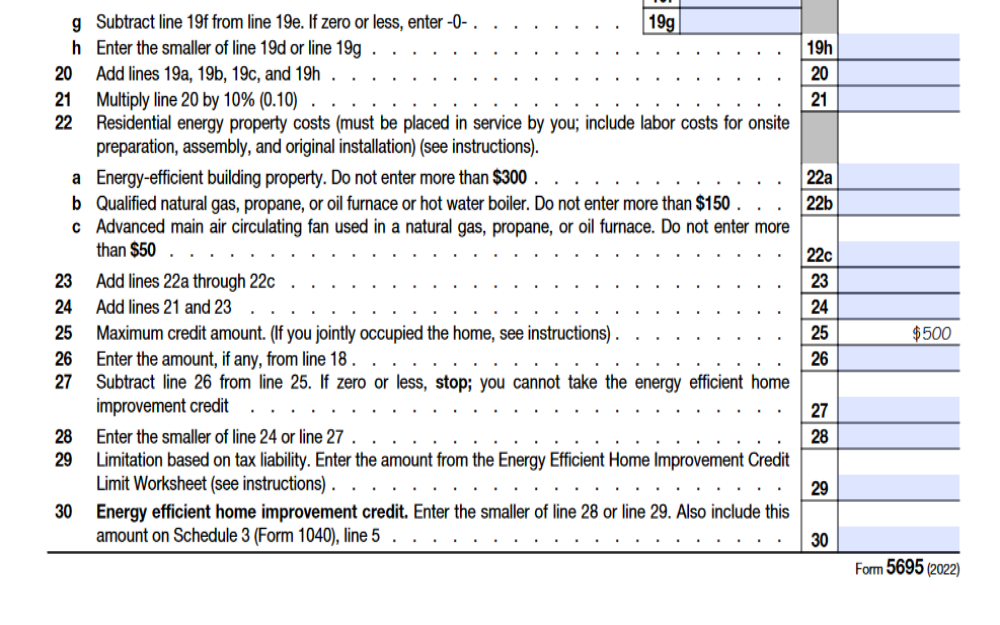
There are also several rules and conditions about the solar tax credit that you should be aware of as well.
The solar tax credit won’t be 30% forever and it won’t exist forever. The 30% rate will exist until 2032.
By 2033, the rate will decrease to 26%. It will then fall to 22% in 2034.
The ITC will then be discontinued in 2035 unless the American government extends it again.
Residential Solar Credits for People in Georgia
Aside from the federal ITC, the state of Georgia does not have any state-level solar tax credit or rebate initiatives. It must also be noted that Georgia does not have any state sales tax exemptions for homeowners who buy a solar panel system.
While it is an unfortunate reality, that does not mean that this will always be the case for Georgia residents.
Remember that the state government (thanks to federal funding) is investing in a $2.3 billion solar energy manufacturing facility, while it won’t happen tomorrow, the state of Georgia will have to legislatively rethink its non-existent solar tax incentive policies in the future.
In the meantime, here are several solar tax credit incentive initiatives that Georgia residents can take advantage of now.
Utility-Based Solar and Green Energy Rebate Initiatives
There are a few energy utility companies in Georgia that offer rebates to homeowners who buy eco-friendly, green power-enabling, and Energy Star-approved appliances.
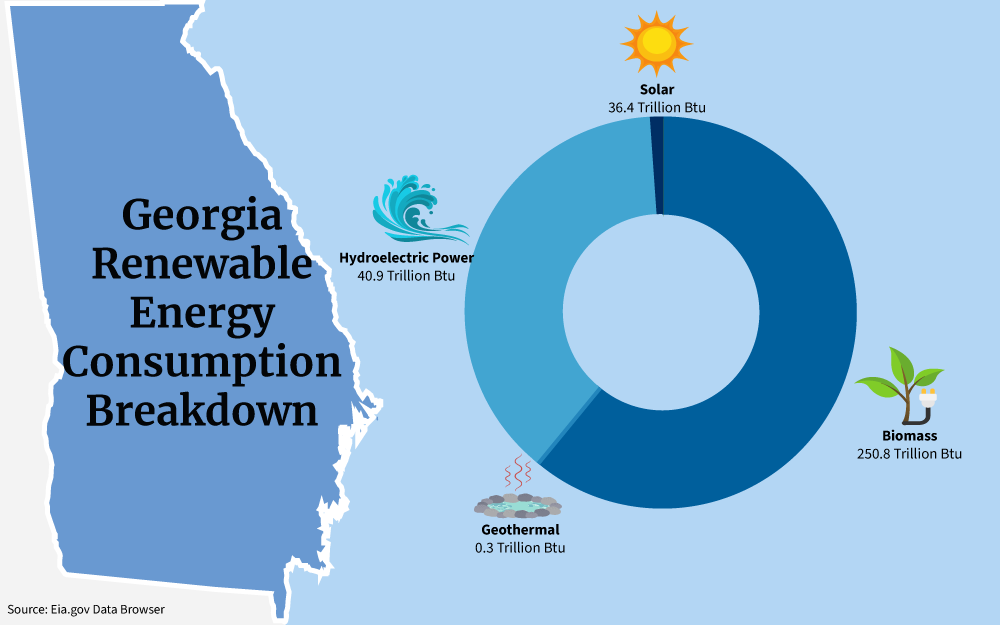
For example, Central Georgia EMC will give you a $400 rebate if you buy a fully electric heat pump and a $100 rebate if you buy a fully electric water heater.12
If you own an electric vehicle then Georgia Power will give you a $250 rebate if you install a Lever 2 Charger for electric vehicles in your home.13 A Level 2 Charger is a specialized charger that charges electric vehicles rapidly, usually anywhere between 1 to 10 hours depending on the type of vehicle and its electric battery.
GA Net Metering Conditions
Net metering is the process by which an energy utility company will either buy back surplus solar energy generated by you or offer you a credit that can be applied to your future energy bills.
A certified inspector will install a smart meter in your home, as commissioned by the utility company, and it will record the amount of energy you use against the excess you generate.
While Georgia’s utility companies do offer net metering they can offer net metering on their own terms. There is no Georgia state law or mandate that legally compels utility companies to automatically offer net metering or the rate by which the utility companies must buy the energy.
Georgia Power offers net metering but on its own terms at the so-called “avoided rate.”14 This means that the utility company can buy your excess solar energy at a lower wholesale rate than the company could buy itself.
Georgia Power buys excess solar electricity back from customers at a rate of 6.68 cents per kWh but only after the customer pays the full retail rate for the electricity they use sold by the utility.
Unfortunately, the company has a 5,000-client limit for its net metering program.
You could make $100 to $300 annually via net metering however, that is an estimate, not the standard. Utility companies don’t have to offer it if they don’t want to.
Georgia Solar Easement Laws
This is not a solar tax incentive, but it is a legal incentive that proves that Georgia is slowly moving towards a renewable energy future.
Solar panels’ environmental impact is undeniable. They don’t leave a carbon footprint while in operation (although there are some drawbacks to solar panel manufacturing and disposal). But, by being classified as a green energy, solar easement laws exist to prevent infringements.
Georgia has solar easement laws that protect your access to unobstructed sunshine on your property especially if you have a solar panel system installation.15
Any neighbor or business that owns trees, structures, or objects that block sunshine on your property has to resolve the issue.
Understanding How Solar Tax Credits Work in GA
A solar tax credit is the solar energy incentive equivalent of a traditional tax credit – it is a tax credit that reduces your tax return obligation. A solar tax credit is not a solar tax rebate or a deduction.
While solar tax rebates exist, a tax rebate entitles you to a check reimbursement after paying for something. A tax deduction is usually a gross income deduction of a tax obligation based on business expense write-offs.
A solar tax credit is a dollar-per-dollar reduction of a tax obligation based on the percentage of the tax credit.
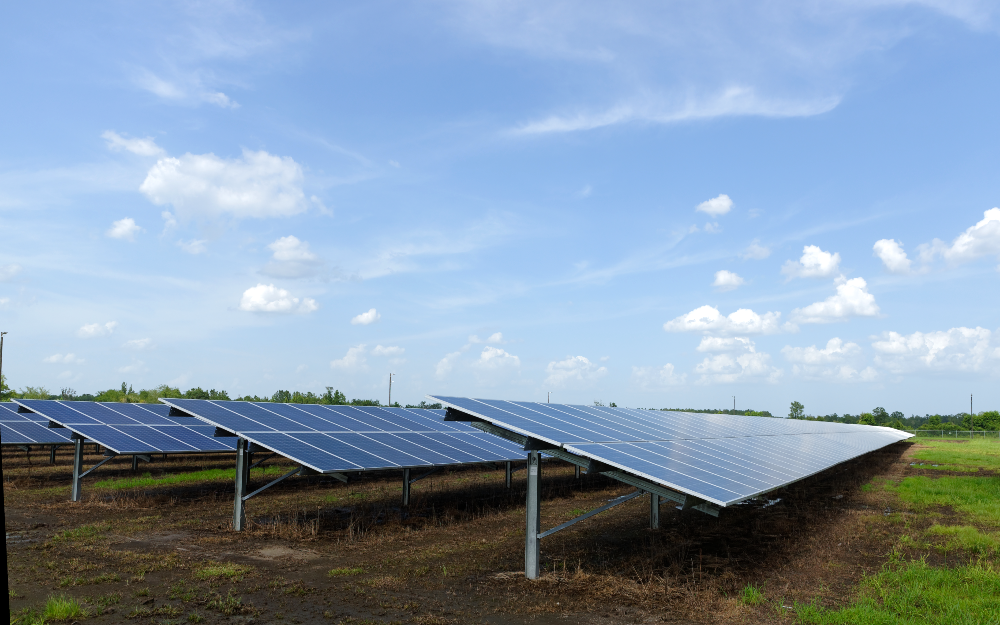
In the state of Georgia, paying $18,700 for a 5 kWh solar panel system might be a conservative estimate.8 For a 10 or 11 kWh solar panel system, you might pay over $28,050.9
So, if you paid $28,050 for a residential solar panel array, then you would qualify for a 30% solar tax reduction. 30% of $28,050 is $8,415.
So, you can reduce your tax burden by $8,415 the next time you file a tax return.
You can’t cash out a solar tax credit and there is no refund either. If you owe $0 in taxes, then the solar tax credit you gain can be spread out against several years of future tax returns until it is used up.
There is no limit to the amount of money you invest in a solar energy installation that you can claim for a solar tax credit. Usually, applicants for the ITC average a $7,500 solar tax credit.10
However, you could potentially qualify for a solar tax credit of more than $7,500 based on how much you initially invested.
Look at it this way – if you invest $28,050 in a residential solar panel array, that amount can be reduced to $19,635 with a 30% solar tax reduction. Based on how much money you save on energy bills against how much solar energy you generate, you could pay off your investment much sooner than later.
It must also be noted that you can only qualify for a solar tax credit if you install solar panel modules that utilize photovoltaic cells.
How Much Do Solar Panels Cost in Georgia?
As previously mentioned, the cost of a solar panel installation system could range anywhere between $18,700 to $28,050.
But these are just conservative estimates, not the standard – you might end up paying less or more depending on your personal circumstances. The amount of money that you could pay for a residential solar panel installation depends on where you live, the amount of roof space you have, the local weather, your energy consumption needs, and other factors.
Some solar industry experts believe that Georgia homeowners might have to pay as much as $37,400 for a 10 kWh residential solar panel system.16
Solar panels cost so much because specialized equipment must be used to convert sunlight into energy. For example, such equipment includes photovoltaic solar panels, rack and mounting equipment, wiring, and solar batteries.
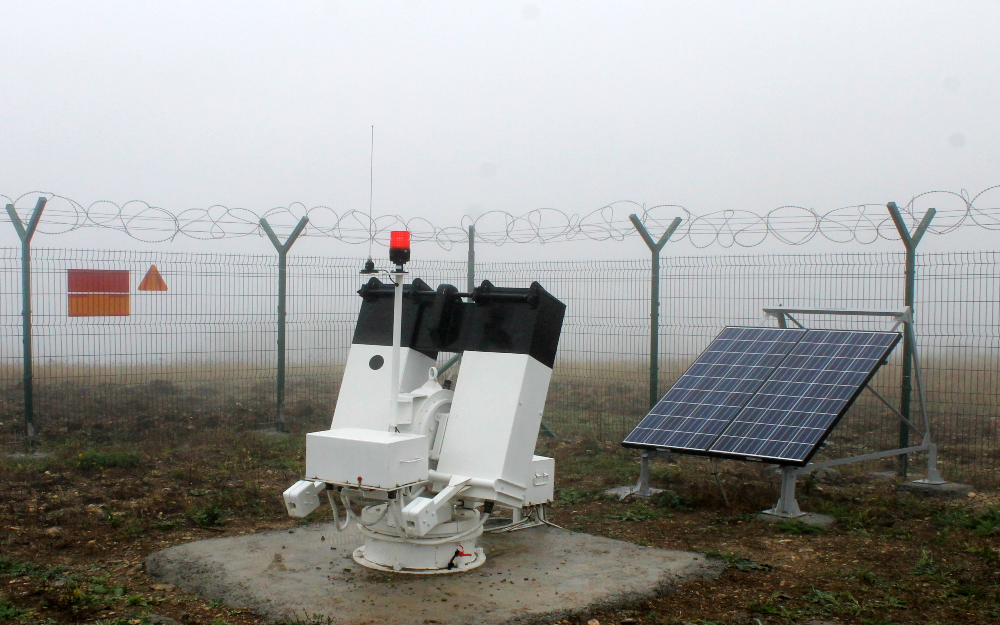
Additionally, this equipment must sustain the ability to channel massive amounts of energy. For example, a very important piece of equipment in a solar panel system is the inverter – this is a piece of equipment that converts DC current into AC.
Solar panel systems convert sunlight energy into DC current – the inverter converts it into AC so you can use the energy in your home.
Can Solar Panels Be Given Away for Free?
Free solar panels are never “free” in Georgia, although some states do offer low income solar home energy systems to residents. You might get a free solar panel system via a power purchase agreement, also known as a PPA.
However, you won’t own the system, it would be owned by a company offering the service.
The company might install the solar panel system on your property for free, but you wouldn’t own it. You would then sign a long-term lease or rental agreement and the PPA company would charge you a fixed rate for the electricity generated by the system.
The company could generate more energy than you are aware of or charge you a higher rate than competitors. And the PPA company would be eligible for the solar tax credit, not you, even though it would be on your property.
You should also beware of any “used solar panels for free” advertisements as well.
National Renewable Energy Laboratory (NREL) Watts Calculator
It can be an overwhelming experience to decide to invest in solar, especially if you live in Georgia.
You should consult a licensed, professional, and well-vetted solar contractor to talk about the process, develop a price quote, figure out how many solar panels you will end up with on your roof or property, how much energy those panels will produce, and how much money you will save in the long term after investing in solar.
You can answer almost all of these questions by using the PVWatts Calculator, an online metric system that helps consumers determine the size of their potential solar panel installation and how much energy it will generate.17 The PVWatts Calculator was developed by the National Renewable Energy Laboratory, also known as NREL, which is also a subsidiary program of the United States Department of Energy.
You may want to consult the help of a solar installation expert or contractor to help you use the PVWatts Calculator because it requires that you input a lot of technical information.
PVWatts Calculator Metrics
You must input a lot of technical information into the PVWatts Calculator to learn about your potential solar panel installation setup. You will need to know what kind of system you potentially want before you use the PVWatts calculator.
You will be prompted to input the address and coordinates of your home into the system. You will then be prompted to confirm the preferred kWhs, the type of solar panel modules desired, the type of solar panel array to be used, and the angle of tilt of the solar panels and the azimuth.
Georgia is located about 2,300 miles north of the equator, which is relatively close. And Georgia experiences about 217 sunny days annually and over 110 completely sunny days.18
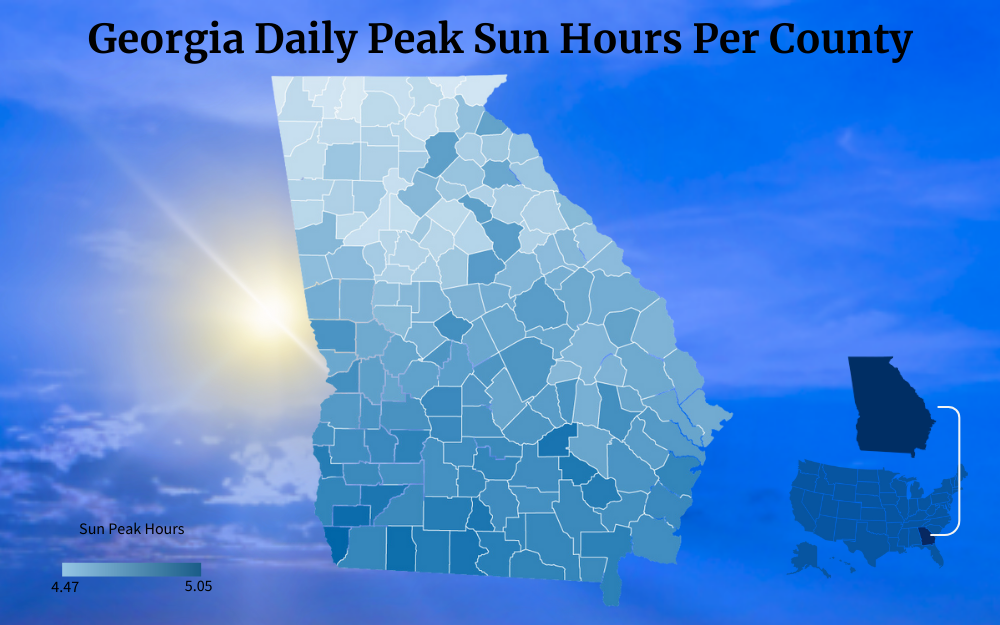
So, your solar panels need to be tilted at the current angles towards the sky to absorb as much direct sunlight as they can.
You will need technical coordinates relative to your home’s location and the angular direction from the horizon from where the sun is rising relative to True North, which is a basic definition of azimuth, to input these parameters into the PVWatts Calculator.
To put it another way, the sun is crossing the sky and shining its light down on a flat surface, the ground, but still on a round planet. Understanding azimuth helps your solar contractor determine the base angle at which to tilt the solar panel toward the sky,
You will then be prompted to input how much you pay for electricity. Then, the PVWatts Calculator will give you a visual simulation of the configuration of your future solar panel system and data on its size and how much energy it will potentially provide you with.
Basic Solar Panel Economics Calculator
The PVWatts Calculator is a great resource to give you a good estimate of how much your solar panel system will cost, how big it will be, how many panels you will need, and how much energy it will generate. You should definitely use it in consultation with a solar panel installation expert.
However, there is an affordable solar savings calculator you can use. Here are some basic metrics, and a basic solar energy savings calculator that you can use to determine if the cost of a residential solar panel installation is worth it for you.
The basic cost of a 10 to 11 kWh solar panel system is $28,050. After a 30% solar tax incentive reduction, that cost lowers to $19,635.
Typically, a Georgia household is burdened with a monthly energy bill payment of $134.11.19 That is the equivalent of paying $1,609.32 annually or about $16,093 per decade for electricity.
Additionally, it is important to note that due to inflation, the monthly utility bill for the average American home surged by over 5% in 2022.5 This point is stressed to emphasize that you are only going to pay more money for the same access to electricity that you have right now in the future.
By investing in a residential solar panel right now, you could save over $1,500 annually on your energy bill.20 That means that you could potentially offset your monthly energy bill by $125 and end up with a $9.11 monthly energy bill will a solar panel system that meets all of your energy consumption needs.
And after a $19,635 investment setup, your solar panel system could completely pay for itself in 13 years!
While it is true that these are just the metrics of a free solar calculator budget, it still gives you a good idea of how much you stand to financially benefit as a homeowner with solar energy.
Selling Solar Power to Georgia: Process Explained
Unfortunately, Georgia does not legally compel utility companies to offer net metering to all of its state homeowners.14 While many do offer net metering, many do not.
One of the larger utility companies, Georgia Power, offers net metering on its own terms and with a cap of 5,000 in a state with almost 11 million people.
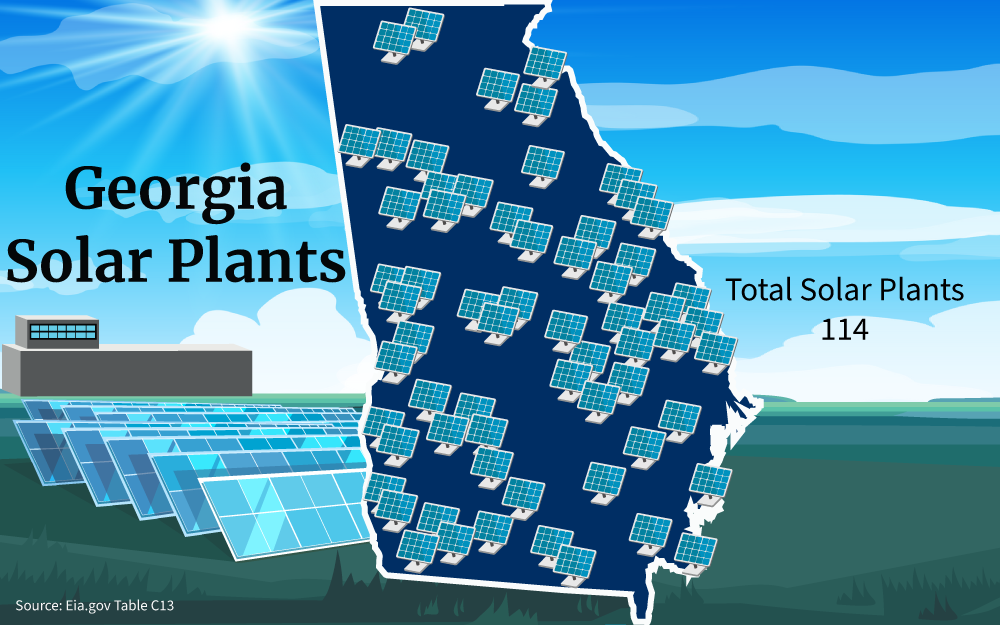
If you are interested in net metering, you need to research and vet several energy companies, see if they offer net metering, compare their rates, and choose the one that works best for you.
Be advised that since Georgia does not legally mandate net metering for homeowners with a guaranteed seller’s rate, the utility company can decide its own price for buying your surplus solar energy.
As more Georgia homeowners embrace solar energy in the future, the state government may mandate net metering in the future.
Contractor Requirements for Home Solar System Installation
Did you know that you may need an electrician for solar panel installation? Do you know the lifespan of a solar panel?
The life expectancy of solar panels usually ranges anywhere between 25 to 30 years depending on the expertise of the manufacturer.
Broken solar panels are something that may happen over time due to exposure to the elements. Solar board components may need regular inspection and repair.
While the life expectancy of solar panels may not be something that you think about when considering an investment in solar panels, it should be. There are a lot of things you need to know about maintaining a solar panel system after purchase.
That is why it is important to consult and hire the right solar panel contractor. You should just hire anyone for the job since it is a major purchase.
Here is what you need to know about hiring the right contractor.
Research Multiple Companies
You should not blindly choose the first solar panel vendor that you find online.
Make a well-researched list of contractors and compare their rates and services. Try to get informed referrals from trusted neighbors, friends, or relatives.
Vetting Process
You use the Better Business Bureau to check the credentials of a prospective contractor. You can also call them and ask if they are licensed, certified, insured, experienced, skilled and if they have references for their work.
Make sure to do your due diligence in researching such contractors so you can create a narrowed-down list of finalists.
Get a Consultation
Contact several solar panel contractors and ask for an in-person consultation. Keep in mind you may have to pay for a consultation.
Talk openly about your proposed project. Ask every question that comes to mind about their services.
Don’t be afraid to ask “What are solar panels used for?” if you have to. You should not be a bystander in this process, so be involved as much as possible.
Ask them for a price quote and a written plan of how they would go about installing your residential solar panel system. If you get an on-site consultation, have the contractor explain how and where the solar panels will be installed.
You could use this time to ask the finalist to use the PVWatts Calculator with you.
The Georgia state government is investing over $2.3 billion into its renewable energy future. While it may seem like a long bet now, it is going to benefit you to invest in residential solar panel energy now.
You could pay off the system within 13 years, generate home solar energy on your own terms, and be one of the first Georgia homeowners to recognize the financial benefits of solar years or decades before everyone else.
Thanks to Georgia solar incentives, homeowners in the state can install their own home solar energy systems and disconnect from the grid.
Frequently Asked Questions About Georgia Solar Incentives
Does the ITC Cover a Roof Replacement?
If you are wondering “If a roof replacement is required, is that covered by the tax credit?” then you should note that the ITC covers only the costs directly related to the equipment, labor, and installation of the solar panels, but it does not extend to expenses like temporary scaffolding, support structures, or roof replacements needed for the installation.10
Can Solar Panels Be Recycled?
When discussing with a contractor, always inquire, “how are solar panels disposed of?” to understand the procedure in case a panel malfunctions on your premises. Solar panels are mainly made of glass, metal, plastic, and silicon, so they can be recycled at a recycling center, although recycling centers dedicated to recycling solar panels are not a thing yet.
Do Solar Panels Degrade During Night?
If you’re wondering “how long can solar panels last without sun,” the answer is a long time, as they do not generate electricity at night and do not degrade unless damaged and infiltrated by moisture.
In the future, there may be specialized solar panels that operate during the night, as evidenced by a 2022 prototype developed by American scientists that converts low-level and ambient background infrared radiation emitted from the ground at night into energy.21
References
1Norris, S. (2023, January 23). $2.3B Qcells Solar Power Investment Holds Major Potential for Georgia. Georgia Tech. Retrieved September 5, 2023, from <https://www.gatech.edu/news/2023/01/23/23b-qcells-solar-power-investment-holds-major-potential-georgia>
2Glover, E. (2023, February 24). The Best And Worst States For Solar Energy 2023. Forbes. Retrieved September 5, 2023, from <https://www.forbes.com/home-improvement/solar/best-worst-states-solar/>
3Foushee, F. (2023, June 13). Solar Panels in Georgia: Take Advantage of the Sun. CNET. Retrieved September 5, 2023, from <https://www.cnet.com/home/energy-and-utilities/georgia-solar-panels/>
4U.S. Census Bureau. (2023). Quick Facts Georgia. U.S. Census Bureau. Retrieved September 5, 2023, from <https://www.census.gov/quickfacts/fact/table/GA/PST045222>
5EIA. (2023, May 31). U.S. residential electricity bills increased 5% in 2022, after adjusting for inflation. EIA. Retrieved September 5, 2023, from <https://www.eia.gov/todayinenergy/detail.php?id=56660>
6Energy.Gov. (2023, March). Homeowner’s Guide to the Federal Tax Credit for Solar Photovoltaics. Energy.Gov. Retrieved September 5, 2023, from <https://www.energy.gov/eere/solar/homeowners-guide-federal-tax-credit-solar-photovoltaics>
7WhiteHouse.Gov. (2023, January). Building a Clean Energy Economy. WhiteHouse.Gov. Retrieved September 5, 2023, from <https://www.whitehouse.gov/wp-content/uploads/2022/12/Inflation-Reduction-Act-Guidebook.pdf>
8Foushee, F. (2023, June 13). Solar Panels in Georgia: Take Advantage of the Sun. CNET. Retrieved September 5, 2023, from <https://www.cnet.com/home/energy-and-utilities/georgia-solar-panels/>
9Simms, D. 2023, September 1). Is Solar Worth It in Georgia? (2023 Homeowner’s Guide) EcoWatch. Retrieved September 5, 2023, from <https://www.ecowatch.com/solar/worth-it/ga>
10Rosen, A. (2023, August 1). Solar Tax Credit: What It Is and How It Works In 2023. NerdWallet. Retrieved September 5, 2023, from <https://www.nerdwallet.com/article/taxes/solar-tax-credit>
11IRS. (2023). Residential Clean Energy Credit. IRS. Retrieved September 5, 2023, from <https://www.irs.gov/credits-deductions/residential-clean-energy-credit>
12CGEMC. (2023). Residential Rebates. CGEMC. Retrieved September 5, 2023, from <https://www.cgemc.com/residential-rebates>
13Georgia Power. (2023). Bought a charger? Apply for a rebate. Georgia Power. Retrieved September 5, 2023, from <https://www.georgiapower.com/residential/save-money-and-energy/products-programs/electric-vehicles/ev-rebates.html>
14Fischer, A. (2022, December 31). Georgia commission fails to expand solar net metering program. PV Magazine. Retrieved September 5, 2023, from <https://pv-magazine-usa.com/2022/12/21/georgia-commission-fails-to-expand-solar-net-metering-program/>
15DeKalb County Georgia. (2023). Solar Permitting for Residential Homes and Businesses. DeKalb County Georgia. Retrieved September 5, 2023, from <https://www.dekalbcountyga.gov/planning-and-sustainability/solar-permitting-residential-homes-and-businesses>
16Ritchie, C. (2023, September 5). Georgia Solar Incentives: Tax Credits & Rebates Guide 2023. Save on Energy. Retrieved September 5, 2023, from <https://www.saveonenergy.com/solar-energy/georgia/>
17NREL. (2023). NREL’s PVWatts® Calculator. NREL. Retrieved September 5, 2023, from <https://pvwatts.nrel.gov/>
18Current Results. (2023). Days of Sunshine Per Year in Georgia. Retrieved September 5, 2023, from <https://www.currentresults.com/Weather/Georgia/annual-days-of-sunshine.php>
19EIA. (2023). 2021 Average Monthly Bill- Residential. EIA. Retrieved September 5, 2023, from <https://www.eia.gov/electricity/sales_revenue_price/pdf/table5_a.pdf>
20Crail, C. (2023, July 28). How Much Do Solar Panels Save The Average Homeowner? Forbes. Retrieved September 5, 2023, from <https://www.forbes.com/home-improvement/solar/how-much-solar-panels-save/>
21Frost, R. and Hebron, E. (2022, August 4). Night solar panels’ are able to generate enough energy to charge a phone. But how do they work? EuroNews. Retrieved September 5, 2023, from <https://www.euronews.com/green/2022/04/08/reverse-solar-panel-technology-still-works-when-the-sun-goes-down>
22Photo by Jud McCranie. (CC BY-SA 4.0). Resized and Changed Format. Wikimedia Commons. Retrieved from <https://commons.wikimedia.org/wiki/File:Photovoltaic_power_station,_Glynn_Co,_GA,_US.jpg>
23Photo by Lynx-extra. (CC BY-SA 4.0). Resized and Changed Format. Wikimedia Commons. Retrieved from <https://commons.wikimedia.org/wiki/File:Anti_hail_system_georgia_stc_delta_2.jpg>
